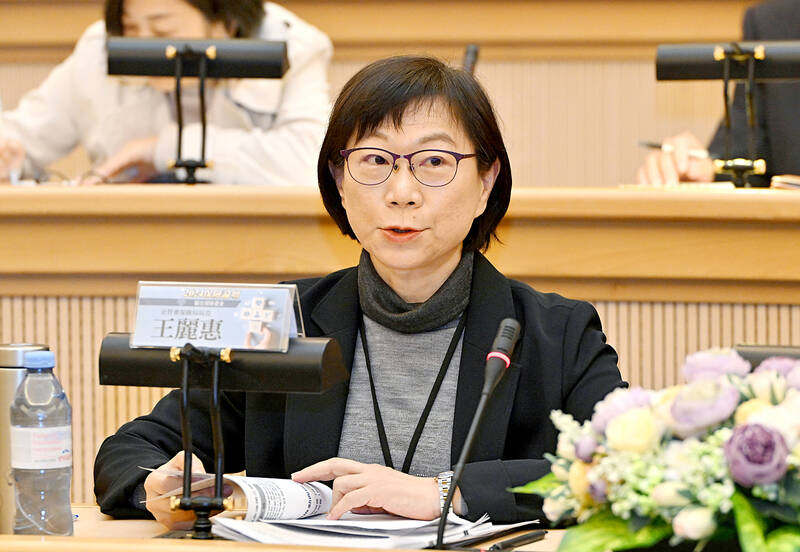Taiwanese regulators have moved to help the nation’s insurers deal with the impact of a recent surge in the local currency, which had left them with massive paper losses on their foreign holdings.
Insurers would be allowed to use six-month average exchange rates when they calculate risk-based capital in their semiannual reports, the Financial Supervisory Commission (FSC) said in a statement yesterday.
At present, insurers use the exchange rates of the final day of the reporting period.

Photo: Tien Yu-hua, Taipei Times
The decision is set to be a relief for the nation’s massive life insurance industry, which this week reported more losses for last month, on top of roughly US$4 billion of currency-related losses in the first four months of this year.
The six major life insurers posted combined losses of NT$34.88 billion (US$1.18 billion) for last month, the worst since December 2023, with Shin Kong Life Insurance Co (新光人壽) reporting the largest loss of NT$15.38 billion, followed by Fubon Life Insurance Co’s (富邦人壽) NT$9.14 billion and KGI Life Insurance Co’s (凱基人壽) NT$7.997 billion.
More than 90 percent of life insurers’ overseas assets are US dollar-denominated, which has hurt the New Taiwan dollar value of their holdings as the greenback has declined.
Worse, there are few signs that the industry is ready for a major overhaul of its investment model given the limited size of the local financial market and a habitual dependence on regulatory support when times are tough.
The FSC said the rule change would help the firms cope with volatile market swings and pave a smoother path as the industry shifts to new capital requirements starting next year.
“We don’t want short-term market volatility to become a disruptive factor for regulatory indicators,” Insurance Bureau Director-General Wang Li-hui (王麗惠) told a news conference in New Taipei City. “We hope that insurance companies can smoothly transition to the new accounting system.”
In another supportive change, the regulator is to increase the policy liability reserve rate, which would help insurers access additional reserves to offset foreign currency losses.
The NT dollar’s 6.98 percent surge against the greenback last month has forced local insurers to either pay up to hedge against further currency gains or face the risk of growing paper losses on their approximately US$780 billion of foreign assets.
The local currency had stabilized earlier this month, but jumped another 0.9 percent yesterday to close at NT$29.660 against the greenback in Taipei trading.
Wang added that the rule changes are only temporary fixes.
Insurers “still need to fundamentally improve their overall operational strength,” she said.

AI BOOST: Although Taiwan’s reliance on Chinese rare earth elements is limited, it could face indirect impacts from supply issues and price volatility, an economist said DBS Bank Ltd (星展銀行) has sharply raised its forecast for Taiwan’s economic growth this year to 5.6 percent, citing stronger-than-expected exports and investment linked to artificial intelligence (AI), as it said that the current momentum could peak soon. The acceleration of the global AI race has fueled a surge in Taiwan’s AI-related capital spending and exports of information and communications technology (ICT) products, which have been key drivers of growth this year. “We have revised our GDP forecast for Taiwan upward to 5.6 percent from 4 percent, an upgrade that mainly reflects stronger-than-expected AI-related exports and investment in the third

Mercuries Life Insurance Co (三商美邦人壽) shares surged to a seven-month high this week after local media reported that E.Sun Financial Holding Co (玉山金控) had outbid CTBC Financial Holding Co (中信金控) in the financially strained insurer’s ongoing sale process. Shares of the mid-sized life insurer climbed 5.8 percent this week to NT$6.72, extending a nearly 18 percent rally over the past month, as investors bet on the likelihood of an impending takeover. The final round of bidding closed on Thursday, marking a critical step in the 32-year-old insurer’s search for a buyer after years of struggling to meet capital adequacy requirements. Local media reports

TECHNOLOGICAL RIVALRY: The artificial intelligence chip competition among multiple players would likely intensify over the next two years, a Quanta official said Quanta Computer Inc (廣達), which makes servers and laptops on a contract basis, yesterday said its shipments of artificial intelligence (AI) servers powered by Nvidia Corp’s GB300 chips have increased steadily since last month, should surpass those of the GB200 models this quarter. The production of GB300 servers has gone much more smoothly than that of the GB200, with shipments projected to increase sharply next month, Quanta executive vice president Mike Yang (楊麒令) said on the sidelines of a technology forum in Taipei. While orders for GB200 servers gradually decrease, the production transition between the two server models has been

ASE Technology Holding Co (日月光投控), the world’s largest integrated circuit (IC) packaging and testing supplier, yesterday announced a strategic collaboration with Analog Devices Inc (ADI), coupled with the signing of a binding memorandum of understanding. Under the agreement, ASE intends to purchase 100 percent shares of Analog Devices Sdn Bhd and acquire its manufacturing facility in Penang, Malaysia, a press release showed. The ADI Penang facility is located in the prime industrial hub of Bayan Lepas, with an area of over 680,000 square feet, it said. In addition, the two sides intend to enter into a long-term supply agreement for ASE to